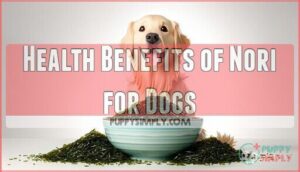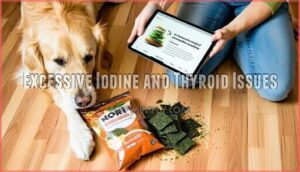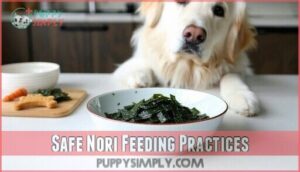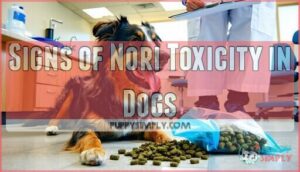This site is supported by our readers. We may earn a commission, at no cost to you, if you purchase through links.

This nutrient-packed seaweed provides beneficial vitamins, minerals, and omega-3 fatty acids that support your dog’s health.
However, you’ll need to serve it in moderation to avoid excessive sodium or iodine intake, which can cause thyroid issues.
Plain nori sheets work best as an occasional treat mixed into regular food, but avoid seasoned varieties containing garlic, onion, or high salt levels that harm dogs.
Some dogs may experience sensitivities, so introduce gradually and monitor carefully.
Understanding proper portions and recognizing warning signs guarantees your pup enjoys nori’s benefits without complications.
Table Of Contents
Key Takeaways
- You can safely feed your dog plain, unseasoned nori as an occasional treat that provides beneficial omega-3 fatty acids, vitamins, and minerals for overall health support.
- You’ll need to limit portions carefully – give small dogs ⅛ teaspoon daily and larger dogs ¼ teaspoon to prevent excessive iodine intake that can disrupt thyroid function.
- You should avoid seasoned nori varieties containing garlic, onion, or high salt levels, as these ingredients can cause toxicity and digestive problems in dogs.
- You must monitor your dog for adverse reactions like vomiting, diarrhea, or lethargy when introducing nori, and consult your veterinarian before adding it to their diet.
Nutritional Benefits of Nori
Nori packs impressive nutritional value that can benefit your dog’s health when fed properly.
This red seaweed contains high levels of iodine for thyroid support, omega-3 fatty acids for skin and coat health, plus essential vitamins A, C, and B12 that boost immune function and energy levels, including thyroid support.
Nori delivers essential nutrients like iodine, omega-3s, and vitamins to boost your dog’s thyroid, skin, and immune health naturally.
High in Iodine and Omega-3s
Through iodine benefits, nori supports your dog’s thyroid function while delivering omega-3 sources for peak health.
This seaweed nutrition powerhouse provides healthy fats that can’t be produced naturally by your pet’s body.
When considering nori for dogs, you’ll find it’s packed with essential fatty acids that support cellular function.
These omega-3s work alongside iodine to create a nutritional foundation that makes seaweed for dogs a valuable supplement option.
Rich in Vitamins and Minerals
Nori packs an impressive vitamin and mineral profile that supports your dog’s overall health.
This seaweed contains vitamins A, C, and B12, which boost immune function and energy levels.
The mineral benefits include iron for healthy red blood cells, calcium for strong bones, and potassium for proper muscle function.
These nutrients work together to enhance your dog’s health and well-being when given appropriately, supporting overall well-being.
Supports Gut Health and Digestion
Your dog’s digestive system benefits substantially from nori’s unique fiber content and natural compounds.
This seaweed contains polysaccharides that support beneficial gut microbes while promoting overall gut health in canines.
- Fiber Content – Aids canine digestion by regulating bowel movements and supporting healthy gut bacteria
- Polysaccharides – Act as natural prebiotics, feeding beneficial gut microbes for ideal digestive function
- Lowcalorie – Provides digestive benefits without adding excess calories to your dog’s diet
- Gut Healing – Contains compounds that may help repair intestinal lining and reduce digestive issues
- Natural Digestive Enzymes – Supports efficient nutrient absorption and healthy dog digestion processes
Can Dogs Eat Nori Safely
Pet owners often wonder about adding variety to their dog’s diet while maintaining safety standards.
Smart pet parents prioritize safety while exploring new treats for their furry companions.
Plain, unseasoned nori sheets are safe for dogs when given in moderation as an occasional treat.
You can confidently offer your furry friend this seaweed option without major health concerns, provided you follow proper feeding guidelines.
However, dogs eating seaweed requires careful consideration of several factors.
Nori sheets for dogs must be completely free from salt, garlic, onion, or artificial flavors that could harm your pet.
The key to safe dog seaweed consumption lies in choosing high-quality, food-grade products specifically designed for canine health.
When considering nori benefits for dogs, remember that moderation prevents potential issues like iodine overload or digestive upset.
Always introduce new foods gradually and monitor your dog’s response to guarantee pet safety remains your top priority.
Understanding probiotic properties is vital for maintaining a healthy gut in dogs.
Health Benefits of Nori for Dogs
When you feed your dog nori, you’re providing essential nutrients that support their overall health and well-being.
This seaweed contains omega-3 fatty acids, vitamins, and minerals that promote healthy skin, boost immune function, and aid proper development in growing puppies.
Promotes Healthy Skin and Coat
Omega-3 fatty acids in nori work like nature’s beauty treatment for your dog’s appearance.
These essential nutrients promote skin health by reducing inflammation and supporting cellular repair.
The omega benefits extend to coat shine, creating lustrous fur that feels soft to touch.
Nori’s nutrient balance includes antioxidants that protect against free radical damage, while fatty acids maintain ideal skin moisture levels for healthy fur growth, which is supported by the omega-3 fatty acids.
Supports Immune System and Energy
Essential immune boosters found in this seaweed include vitamins A, C, and B12, which strengthen your dog’s natural defenses against illness.
These antioxidants work alongside omega-3 fatty acids to reduce inflammation throughout the body.
The iodine content supports healthy metabolism, while nutrient absorption improves when you incorporate this supplement into meals.
Together, these vitamins create ideal conditions for sustained dog wellness and energy production.
Aids in Healthy Development of Puppies
Growing puppies require proper nutrition to support their rapid development phases.
Nori provides essential nutrients that aid Puppy Growth Stages, including minerals for Bone Development and vitamins supporting Cognitive Development.
The seaweed’s nutrient profile offers an Immune System Boost during critical weaning periods.
When introducing nori as dog food supplements, consider your puppy’s specific canine dietary needs and consult your veterinarian about appropriate Weaning Strategies for ideal dog health.
Risks of Feeding Nori to Dogs
While nori offers nutritional benefits for dogs, it carries significant health risks that require careful consideration.
Excessive iodine intake can disrupt thyroid function, while high sodium content and potential for intestinal blockages make proper portion control essential for your dog’s safety.
Excessive Iodine and Thyroid Issues
Nori’s high iodine content poses risks for your dog’s thyroid health.
Excessive iodine can trigger thyroid dysfunction, causing hormone imbalances that lead to weight changes, restlessness, and rapid heart rate.
Dogs process iodine differently than humans, making them more susceptible to iodine poisoning.
Chronic overconsumption may result in goiter and long-term thyroid damage, especially concerning for dogs with existing thyroid issues.
Understanding the role of thyroid support is essential for maintaining canine hormonal balance.
Intestinal Blockages and Sodium Overload
Dried nori sheets present significant blockage risks when they expand in your dog’s stomach after absorbing digestive fluids.
This expansion can cause severe gut obstruction requiring emergency surgery.
- Dried seaweed swells to three times its original size inside the stomach
- Salt content can trigger sodium poisoning within hours of consumption
- Long nori strands may twist around intestinal walls causing damage
- High sodium levels lead to dehydration and digestive issues
- Intestinal blockage symptoms include vomiting, lethargy, and loss of appetite
When considering raw fish, owners must understand raw fish bones risks to guarantee safe feeding practices.
Allergic Reactions and Digestive Issues
While introducing nori to your dog’s diet, watch for Food Sensitivities that trigger Allergy Symptoms like itching or swelling.
Digestive Problems including vomiting, diarrhea, and Stomach Upset may occur if your pet’s digestive system can’t process seaweed properly.
Monitor for Intestinal Issues that could worsen existing conditions.
| Allergic Reaction Signs | Digestive Issue Symptoms |
|---|---|
| Skin itching and redness | Vomiting within hours |
| Facial swelling | Diarrhea or loose stools |
| Excessive scratching | Loss of appetite |
| Respiratory distress | Abdominal discomfort |
Safe Nori Feeding Practices
When feeding nori to your dog, you’ll want to stick with plain, unseasoned sheets that contain no added salt, garlic, or artificial flavors.
Break the nori into small pieces and sprinkle it over your dog’s regular food as a nutritional supplement, using no more than ¼ teaspoon daily for larger dogs or ⅛ teaspoon for smaller breeds, following the guideline of daily intake.
Plain and Unseasoned Nori Sheets
When choosing plain nori sheets for your dog, you’re looking for seaweed safety without additives.
Check labels carefully—proper nori nutrition comes from products free of salt, garlic, and artificial flavors that compromise dog digestion. A balanced diet with whole food ingredients is essential for maintaining overall health and well-being in dogs.
- Read ingredient lists: Avoid nori dog treats with seasonings, oils, or preservatives that affect iodine levels
- Choose food-grade products: Plain nori sheets from reputable brands guarantee consistent feeding guidelines
- Verify sodium content: Low-sodium options prevent digestive upset while maintaining nori benefits for dogs
Mixing With Regular Dog Food
Mixing nori with your dog’s regular food transforms ordinary meals into nutrient-rich powerhouses.
Sprinkle crushed nori sheets directly onto kibble or wet food for seamless meal enhancement.
This dog food mix method guarantees gradual introduction while monitoring reactions.
Use nori supplements as nutrient boosters, adding healthy dog snacks naturally.
These seaweed additions provide essential minerals without overwhelming your pet’s digestive system.
For ideal nutrition, consider using Nori Dog Food products to enhance your dog’s diet with seaweed additions and make it a powerhouse.
Nori Vs Other Seaweed Types
Not all seaweeds are created equal regarding your dog’s health and safety.
While nori offers specific nutritional benefits, kelp and wakame provide different nutrient profiles and safety considerations that you should understand before choosing the best option for your pet, considering their unique nutritional benefits.
Comparison of Nutritional Profiles
When comparing seaweed nutrition for dogs, nori stands out with superior protein content and vitamin profiles. Understanding nutrient density differences helps you choose the best seaweed for dogs based on your pet’s specific needs.
Nori’s benefits can be considered as part of dog health supplements.
| Nutrient | Nori | Kelp | Wakame |
|---|---|---|---|
| Protein Content | 50% dry weight | 5.6-10.2% | 8-12% |
| Iodine Level | Moderate | Very High | High |
| Vitamin C | Highest | Low | Moderate |
| Omega-3 Fatty Acids | High DHA/EPA | Low | High PUFA |
| Mineral Content | Balanced profile | Iron-rich | Calcium-rich |
Nori’s macronutrient balance and bioavailability factors make it ideal for canine seaweed benefits without excessive iodine risks.
Safety Considerations and Precautions
While nutrition matters, safety comes first when selecting seaweed for your dog.
Each type carries unique toxicity risks that require careful consideration.
| Seaweed Type | Primary Safety Concern | Risk Level |
|---|---|---|
| Wild Beach Seaweed | Intestinal Obstruction, Salt Poisoning | HIGH |
| Seasoned Nori | Toxic Ingredients, Sodium Poisoning | HIGH |
| Plain Nori | Iodine Overload | LOW |
| Kelp Supplements | Sodium Toxicity | MEDIUM |
| Wakame | Digestive Issues, Moderation Required | MEDIUM |
Seaweed poisoning symptoms develop quickly, making prevention your best defense against potentially life-threatening complications.
Kelp and Wakame as Alternatives
Both kelp and wakame offer excellent marine algae alternatives to nori for canine nutrition.
Kelp provides robust iodine levels and minerals, while wakame delivers omega-3 fatty acids with trace heavy metals. Both require moderation to prevent thyroid disruption.
When considering kelp supplements, it’s vital to understand the benefits of kelp for dogs in relation to their nutritional needs.
| Seaweed Type | Key Benefits | Safety Notes |
|---|---|---|
| Kelp | High iodine, calcium, iron | Monitor thyroid function |
| Wakame | Omega-3s, vitamins A/C | Contains trace arsenic |
| Nori | B12, protein, low calories | Avoid seasoned varieties |
| All Types | Digestive fiber, minerals | Use plain, unseasoned only |
Signs of Nori Toxicity in Dogs
While nori is generally safe for dogs, you’ll need to watch for signs of toxicity if your pet consumes too much of this seaweed.
Symptoms can develop quickly and require immediate veterinary attention to prevent serious health complications.
Symptoms to Watch Out For
Vigilance becomes your best defense when monitoring your dog after nori consumption.
Watch for vomiting signs and diarrhea symptoms, which typically appear within hours.
Lethargy causes concern, especially when paired with weakness or upset stomach.
Bloating issues signal potential obstruction risks, requiring immediate attention. These symptoms escalate quickly, making early detection vital, and highlighting the importance of vital signs monitoring.
When to Seek Veterinary Care
If your dog shows persistent vomiting, diarrhea, or lethargy after eating nori, contact your veterinarian immediately.
Emergency care becomes necessary when symptoms worsen or include difficulty breathing, excessive drooling, or loss of coordination.
Don’t wait—prompt veterinary advice can prevent serious complications.
Poison control resources and professional health warnings help identify toxic symptoms requiring immediate vet visits for proper treatment, and it is crucial to follow these warnings to ensure your dog’s health and safety, especially in cases of emergency care.
Prevention and Emergency Treatment
Prevention centers on responsible feeding practices and immediate action during emergencies.
Remove all nori from your dog’s reach if toxicity signs appear. Contact your veterinarian immediately for guidance on first aid measures.
Keep Poison Control numbers accessible and document symptoms like diarrhea or choking hazards. Never induce vomiting without veterinarian advice, as salt poisoning requires specific emergency care protocols for toxic ingredients, including immediate action.
Feeding Nori to Dogs Responsibly
You’ll need to work closely with your veterinarian before adding nori to your dog’s diet, especially if they’ve existing health conditions or take medications.
Start with tiny amounts and watch for any digestive upset, changes in behavior, or signs of iodine sensitivity before gradually adjusting portions based on your dog’s size and response.
Consultation With Veterinarians
Before introducing nori to your dog’s diet, consult your veterinarian for personalized guidance. Veterinary advice guarantees safe integration based on your pet’s health status, size, and dietary needs.
- Individual health assessment – Your vet evaluates existing conditions like thyroid issues or food sensitivities
- Proper serving recommendations – Veterinary professionals determine safe portion sizes for your dog’s weight
- Monitoring protocols – Vets establish check-up schedules to track thyroid function and overall wellness
- Emergency preparedness – Veterinarian advice includes recognizing toxicity symptoms and response procedures
It’s also vital to understand the importance of probiotic rich foods in maintaining your dog’s gut health and overall well-being.
Monitoring for Adverse Reactions and Adjusting Serving Sizes
After your veterinarian’s approval, watch for reaction signs like vomiting, diarrhea, or lethargy when introducing nori. Start with tiny amounts—⅛ teaspoon for small dogs, ¼ teaspoon for larger ones—to prevent overdose and toxicity levels.
Monitor digestion issues closely, adjusting serving limits based on your dog’s response. Can dogs eat nori safely? Yes, but moderation prevents allergic reactions and avoids toxic ingredients.
For ideal nutrition, consider using nori dog products that cater to specific dietary needs.
Frequently Asked Questions (FAQs)
Can seaweed kill dogs?
Seaweed won’t kill your dog, but it can cause serious health problems.
Wild seaweed contains excessive salt and can expand in their stomach, causing blockages.
Stick to plain, unseasoned nori in small amounts.
Is seaweed good for dogs teeth?
While seaweed doesn’t directly clean teeth like dental chews, its tough texture can provide mild abrasive action that helps remove plaque buildup when dogs chew it properly.
Is dried seaweed bad for dogs?
Dried seaweed isn’t inherently bad for dogs, but it poses risks.
You’ll want to avoid seasoned varieties containing garlic or onion.
Plain dried seaweed can expand in your dog’s stomach, potentially causing dangerous blockages or digestive upset.
Can dogs eatwasabi seaweed?
No, you shouldn’t feed your dog wasabi seaweed. Wasabi contains compounds that can irritate your dog’s digestive system, causing stomach upset, vomiting, and diarrhea. Plain, unseasoned nori is safe instead.
can dogs eatseaweed rice crackers?
You shouldn’t feed your dog seaweed rice crackers because they’re typically loaded with salt, seasonings, and additives that can harm your pup’s health and cause digestive issues.
Can nori be bad for dogs?
Yes, nori can harm dogs if you’re not careful.
Plain, unseasoned nori in small amounts is generally safe, but excessive iodine disrupts thyroid function.
High sodium content risks salt toxicity, causing vomiting and dehydration.
How much dried nori can dogs eat?
For larger dogs, you’ll want to limit dried nori to ¼ teaspoon daily, while smaller pups need just ⅛ teaspoon.
Always crush it into powder form first to prevent choking hazards and intestinal blockages.
How much nori is good for dogs?
Like a lighthouse guides ships safely to shore, proper nori portions protect your dog’s health.
Give larger dogs ¼ teaspoon daily, smaller dogs ⅛ teaspoon.
This keeps iodine levels safe while providing beneficial nutrients without risking thyroid disruption.
What seaweed is bad for dogs?
Wild seaweed poses serious risks – it’s high in salt, can expand in your dog’s stomach causing blockages, and may contain harmful parasites or pollutants from beaches.
How much nori can a dog eat?
Small dogs need ⅛ teaspoon of plain, unseasoned nori daily, while larger dogs can have ¼ teaspoon.
You’ll want to crush the dried sheets into powder form and sprinkle it over their regular food as a supplement, not a meal replacement.
Conclusion
Picture your furry friend eyeing that crispy nori sheet with curious anticipation.
Can dogs eat nori? Absolutely, when you serve it plain and unseasoned. You’ve learned that this nutrient-dense seaweed offers valuable vitamins, minerals, and omega-3s that support your dog’s overall health.
However, moderation remains essential to prevent thyroid complications from excessive iodine intake. Always choose plain varieties, avoid seasoned options with harmful additives, and introduce gradually while monitoring for sensitivities.
Your veterinarian can provide personalized guidance for safe nori feeding practices, ensuring your dog receives the benefits of nori while minimizing risks, with a focus on overall health.














